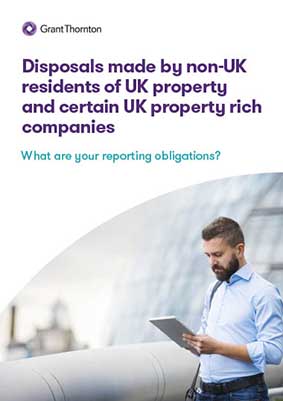-
Sector Focus
We specialise in the investment management industry offering audit, assurance, tax and corporate recovery and liquidation services.
-
Personal Tax Services
There are many tax rules that can affect you personally and therefore which will have an impact on your personal wealth.
-
QI Compliance
Qualified Intermediaries (QI) have to take action now to perform a Certification to the Internal Revenue Service (IRS).
-
Download our tax brochures
The tax teams at Grant Thornton aim to provide the Channel Islands with a premier tax advisory service both to private clients and the business community including the investment management industry.
-
Jersey Tax Return
A secure sign in page to file Jersey Tax Returns through the Grant Thornton tax portal.
-
ESG
ESG can either be seen as a risk management tool or an opportunity, either way it is imperative to your business, whatever your size and whether you are listed or not.
-
Professional Services
Business and accounting support for professional services
-
Finance Industry
We work with a broad range of clients and their financial stakeholders, from entrepreneurs in the early days to fast growing and established businesses to public companies competing in global markets.
-
Local Businesses
Businesses come in many shapes and sizes – from innovative start-ups to long-established local businesses. But however large or small your business, the chances are you face similar challenges.
-
Corporate Insolvency
Our corporate investigation, Guernsey liquidation and recovery teams focus on identifying and resolving issues affecting profitability, protecting enterprise value and facilitating a full recovery where possible.
-
Corporate Simplification
Redundant corporate entities can over complicate group structures and waste thousands of pounds in unnecessary costs each year. 46% of the c.15,500 companies controlled by the FTSE100 are dormant and it is estimated that the average cost of administering dormant companies is between £3,500 and £5,000 per company, per year.
-
Debt Advisory
Our Debt Advisory team provides commercial and financial debt advice to corporate entities and public sector bodies in a range of sectors. Our engagements include advice on stand-alone transactions and solutions or as part of an integrated business plan, in both the project and corporate arenas.
-
Exit Strategy Services
We offer a tailored methodology designed to enable a company to be reviewed in a group context to assess ways to maximise its value.
-
Financial Restructuring
For companies challenged by under-performance we work with management teams, shareholders, lenders and other stakeholders to implement financial restructuring solutions creating a stable platform for business turnaround.
-
Strategic performance reviews
Strategic performance reviews analyse the key drivers of performance improvement. Our specialists utilise a framework to evaluate financial and operational options and to identify solutions for businesses and their stakeholders.
Recent changes to tax regimes that impact the sale of UK property.
Since 6th April 2019, the scopes of UK Capital Gains Tax (“CGT”) and UK Corporation Tax (“UKCT”) have been extended to now include gains realised by non-UK residents on both direct sales of UK property, and on the sale of interests held in companies which are deemed to be ‘UK property rich.’
What does this mean for non-UK persons and companies?
This extension now applies to the following scenarios:
1. Direct property holdings
- Where a non-UK resident individual, company, or trust disposes of UK property which they own – whether the property is residential, or commercial.
- Where commercial holdings have seen an increase in value since 6 April 2019, UK tax applies on the gain. For residential holdings, the taxable gain is calculated from 6 April 2015.
2. Indirect property holdings
- If such a non UK resident sells an interest in a ‘UK property rich’ company (defined as 75% or more of the company’s value deriving from UK property), then any increase in value of the interest since 6 April 2019 is taxable.
- This includes ‘indirect holdings’ of property rich companies, where the disposal could be of an interest held in a parent or holding company, where its subsidiary(s) in turn hold UK property. The non-resident (combined with any related parties) must hold, or at some point in the previous two years, must have held at least a 25% interest in the property rich company. Otherwise, the rules will often not apply. However, please note that where less than a 25% holding is held in a “Collective Investment Vehicle”, which includes, amongst other things, a holding in a UK REIT, a sale of that (less than 25%) interest will be subject to UK tax.
To help those impacted by the latest extensions, we have published a briefing paper on the subject to explain how and when these new regimes might apply, where there are exemptions and how to calculate the gains. We also discuss the reporting and payment obligations arising from these new rules.

